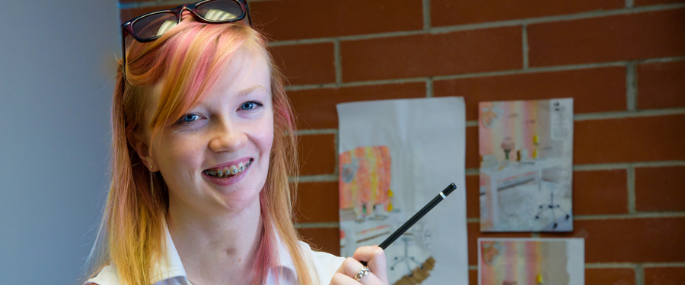
Quinn Laudersmith
2021 Recipient
Quinn Laudersmith was diagnosed with Wilms tumour at a young age, and he’s proud to say he’s a survivor. His cancer journey presented him with many challenges that he has overcome. Quinn also maintains a positive attitude and continuously thrives to improve as a person.
His close contacts describe him as thoughtful, courteous, and mature for his age, but he is also kind, good natured and has a great sense of humour. Quinn has given back to the community in countless ways — raising $70,000 for Kids Cancer Care, helping seniors, serving as a cadet, and canvassing for the Heart and Stroke Foundation. He enjoys everything to do with avant-garde fashion. Historically, avant-garde in the French military referred to a small military group that scouted ahead of the main force. Quinn hopes to create a business in the men’s fashion industry that does just that — stays a head of the industry. He’s jump starting his career with a degree in business administration at Mount Royal University.

Rafi Kondapalli
2020 Recipient
“It’s going to be extremely difficult, but I always like a challenge and it’ll be worth it.” – Rafi Kondapalli
Rafi knows all about hard work. He has worked exceedingly hard for every academic win he’s ever had.
As a toddler, Rafi was diagnosed with leukemia. After years of chemotherapy, neurological testing revealed serious memory deficits in Rafi. To circumvent these issues, he spent his childhood memorizing math equations, multiplication and division tables with his mother Guven. Originally from Turkey, Guven would read the equations aloud from her Turkish textbook and Rafi would mentally translate before repeating them back in English.
But when COVID-19 hit in the winter of 2020 and school was unceremoniously closed, things that were already difficult were about to get even tougher. It was Rafi’s last year of school and he needed to get into engineering.
Rafi accessed our online tutoring service, where he was matched with an IT engineer Steve Reid. With Steve’s guidance, Rafi completed his grade-12 year at the top of his class.
Tutoring with Steve throughout the summer, Rafi also tackled college-level math and science to prepare for studies in the fall. He has been accepted into the Electronics Engineering Technology program at SAIT, a program he is pursuing with the help of a Kids Cancer Care scholarship.
“Just knowing that Rafi’s memory has been affected by chemo is half the battle,” says Steve. “If you know this and you’re willing to put in the effort, you can work around it. Rafi is an example of how hard work pays off.”

Madeline Pillipow
2019 Recipient
You would never imagine what Madeline has achieved while fighting Hodgkin’s lymphoma. She’s captain of the basketball team, head trainer for the boys’ football team, peer supporter, drama member, public speaker, member of the Kids Cancer Care Teen Leadership Program, fundraiser and volunteer.
She has given hundreds of hours to her school and community. Madeline is eager to help other children facing impossible situations because she knows how powerful it can be to talk to someone who understands. While cancer made her feel alone, meeting others with similar challenges through in the Teen Leadership Program helped her to feel understood and appreciated. It helped her to become an outgoing person again.
As one of Madeline’s coaches explains, “Madeline is a remarkable young woman and I have no doubt that with her commitment to personal achievement, combined with her passion for helping others, she will be extremely successful in everything she chooses to pursue.”
In the fall, Madeline will be taking her energy and leadership west, as she realizes a long-time dream of studying sciences at the University of Victoria.

Julie Deleemens
2018 Recipient
Diagnosed with laryngeal cancer at the age of 18, Julie Deleemans remembers the psychological toll of cancer more than its physical hardship. They removed the cancer with a total laryngectomy — a surgical procedure that removed her larynx (voice box), thyroid and surrounding lymph nodes.
Julie then underwent three rounds of high-dose chemotherapy combined with 30 rounds of high-dose targeted radiation. Although the cancer treatments lasted only three months, the aftermath will last forever. Julie was left with a permanent tracheotomy — a hole in her throat for breathing. The radiation caused extremely painful inflammation and ulceration in her throat and ultimately damaged the tissue, causing her body to reject the TEP valve — a tracheoesophageal voice prosthesis to help her to speak.
“I was left with a tiny whisper of a voice and permanently disfigured by the surgery,” says Julie. “I could no longer speak normally, so I lost my jobs. I lost friends. Travel plans were cancelled. My life was shattered. I had no idea where I fit in anymore or what I was supposed to do.”
With a health care team singularly focused on her physical survival, Julie struggled without the social support of her friendships and without the professional support of a trained psychologist. It was an extremely isolating and painful experience.
Unable to pursue her university plans or land a job, Julie was forced to go on social assistance and continue living with her family. Instead of diving into a newfound independence, which normally comes with young adulthood, Julie was becoming more dependent.
Permanently disfigured by surgery, Julie struggled with her body image. She struggled with severe depression and anxiety and was later diagnosed with post-traumatic stress disorder. For a few years, Julie was suicidal.
After suffering for several years and trying unsuccessfully to get help, Julie decided she needed to make a change and started an undergraduate program in psychology at the University of Western Ontario. “I was looking for answers to questions that others could not seem to give me,” says Julie. “I was searching for a way to heal myself.”
With the help of a Kids Cancer Care Derek Wandzura Memorial Scholarship, Julie is pursuing a PhD in psychosocial oncology at the University of Calgary Cumming School of Medicine. She is investigating the effects of chemotherapy on the gut microbiome to understand how changes in the gut may affect the survivor’s physical and psychological wellbeing.
With this research, Julie hopes to arm researchers and health care professionals with the knowledge they need to develop targeted interventions to prevent or reverse the long-term effects of cancer treatments.
Julie is interested in putting her research into action by developing the interventions herself. She sees a day when cancer treatments may be supplemented by proper nutritional support (i.e., a healthy diet rich in pre- and probiotics), regular exercise and complementary therapies such as mindfulness and yoga. Patients would also receive social and psychological support throughout the cancer journey.
“After nearly a decade I feel I have finally come full circle — from patient to advocate and now researcher,” says Julie. “My experience with cancer is why I do the work that I do. For many years I wondered why I had survived cancer and what my purpose in life is. Now I understand. I firmly believe the reason I survived and endured such challenges was to prepare me for the opportunity to help others navigate the cancer journey.”
Julie draws strength from her research work and from the words of Carl Jung, the Swiss psychiatrist and psychoanalyst, who famously said, “I am not what happened to me. I am what I choose to become.”
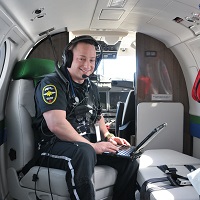
Trey Elkins
2016 Recipient
Trey Elkins has always wanted to do more.
Growing up in Mississippi without a father, Trey wished he had a dad to take him fishing. He wanted a dad to teach him new things and take him to new places, but that wasn’t possible because cancer had taken his father away when Trey was five.
After losing their home to Hurricane Katrina and moving to Alberta, Trey found himself battling the same disease that took his father’s life. Stuck at the hospital, Trey longed to be outside, hanging with his friends. He wanted to be anywhere, but the hospital. Again, that wasn’t possible because Trey needed 29 rounds of chemotherapy and eight surgeries to survive.
After treatment, as he grew stronger and healthier, Trey still longed to do more. That’s when he made a promise that he would do more, for himself and others, with the life he was given.
Thanks to you, this time, it’s possible for Trey to do more.
With the help of a Kids Cancer Care Derek Wandzura Memorial Scholarship, Trey studied Advanced Care Paramedics at SAIT. He now works at Advanced Paramedic Ltd., a company that provides air ambulance EMT and paramedic services to remote areas for Alberta Health Services.
“I’m pretty fortunate to land this job,” says Trey. “A big part of me getting it was the scholarship and volunteer work I’ve done with Kids Cancer Care.”
Trey also credits his mother Kim for his success. He recalls one night at the hospital when he was having a particularly tough time – the inevitable “Why me?” moment. “My mom looked at me and said, ‘Trey, you’ve been through a lot. This whole family has, but there is always someone worse off. Don’t you forget that.’” He didn’t forget.
Trey’s mother wasn’t exaggerating for effect. They had faced unthinkable adversity. After losing her husband Bill to cancer, Kim and her boys lost their beautiful waterfront property in the aftermath of Hurricane Katrina. This was the home she had struggled for years to keep through refinancing, foreclosure notices and living pay cheque to pay cheque. Flooded in seven feet of Mississippi mud and water.
After losing everything in the flood, Kim moved her family to Alberta, seeking a new start and an end to hardship. Not long after settling in Airdrie, Trey was diagnosed with stage four osteosarcoma. He was 14.
By the time Trey was ready for college, the family was experiencing a serious financial setback. As an American citizen, Trey was also facing hefty international student fees and tuitions to attend a Canadian post-secondary school.
The Kids Cancer Care scholarship that you made possible could not have come at a better time.
“My oldest brother had given me all the money he could,” says Trey. “My mom was paying most of my bills. Even my girlfriend’s parents loaned me some money. I was broke. If it were not for the scholarship I received and the generous amount that it was, I would have had to drop out of school.”
Thanks to you, in his last year of school, Trey had a Kids Cancer Care scholarship in the bank, a mother’s wisdom in his heart and a powerful desire to do more with his life.
“My story isn’t exceptional,” says Trey. “Anyone who endured what I have would emerge from their struggle with a new outlook on life. I kept my resilience by recognizing that people around me were suffering and I began to focus on relieving the suffering of those around me.”
That’s why Trey was in Fort McMurray, providing medical support to victims of the wildfires in 2016 and why he volunteers as a trainer for a high school football team. And that’s why Trey volunteers as a medic and spokesperson for charities such as Kids Cancer Care, the Alberta Children’s Hospital and the Alberta Cancer Foundation. He’s determined to do more.
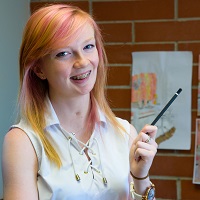
Kelly Hogarth
2015 Recipient
“I realize that by bringing my art form into people’s lives, I can turn a house into a home. That’s huge. Having a beautiful home is one of life’s big dreams. To be part of someone’s dream through design is amazing.”–Kelly Hogarth
As a child, Kelly Hogarth spent most of her free time drawing and reading. She remembers being more fragile and sickly than her classmates, so these quieter activities were perfect for her.
“I was always getting a cold or the flu,” Kelly says. “In the winter, I had to spend recess and lunchtime inside, while the other kids were playing outside. That was alright, I could draw or read. I was okay with that. I understood why I had to stay inside.”
Kelly knew that a weakened immune system was one of many side effects that could come from 28 rounds of chemotherapy, which she received as a child for Ewing’s sarcoma. A rare cancer that forms in the bone or soft tissue, Ewing’s sarcoma normally appears in teenage boys. Discovering the cancer in a five-year girl was surprising for everyone.
“My mom was on a business trip and my dad and I were visiting my grandma,” says Kelly. “I was playing on her kitchen floor, when grandma noticed that my jaw looked swollen. At first they just assumed I had the mumps.”
Because the tumour was growing in Kelly’s jawbone, there was a severe risk that the cancer would spread to her brain, which is why her treatment called for 14 rounds of chemotherapy both before and after a 16-hour surgery to remove the cancerous bone. During surgery, the doctor took the fibula from Kelly’s right calf, broke it and re-fashioned it into a jawbone, which is secured by screws and bolts.
Kelly bears the scars of her battle to this day. She still has no bottom teeth on that side of her mouth and she recently underwent advanced surgery to build up her jawline.
“Cancer really shaped who I am today,” says Kelly. “I’ve always been hugely into art—sculpting, drawing, painting—whatever the medium, I loved it.”
She means this quite literally and figuratively.
It was during the many inside-times that young Kelly honed her skills as an artist. In grade 11, she realized that career in art may not be feasible, so she began exploring other avenues to express herself while making a living. That’s when Kelly decided to pursue a career in interior design.
Thanks to you, Kelly studied interior design at Lethbridge College with the help of a Kids Cancer Care Derek Wandzura Memorial Scholarship. With your help, Kelly was able off-set some of the significant expenses related to studying interior design.
“That $2,500 went straight to my text books and art supplies,” says Kelly, who also used her scholarship for laptop and residence fees. “Without those things I don’t think I would have found the deeply routed passion I have for this design stuff.”
But the scholarship represents more than a monetary award for Kelly. “It wasn’t until I started filling out my scholarship forms that I got my first true taste and rush of excitement for my college experience,” says Kelly. “This scholarship is far more than a dollar amount inscribed on an incredibly crafted sheet of paper. It is my excitement, a smile, a butterfly ready to break free from my stomach. It is a physical piece of my future.”
During her time at Lethbridge College, Kelly fell in love with the city and knew she had to stick around. She now works at a local décor store, a place that surrounds her with the things that people use to make their homes beautiful.
The store has a little bit of everything for everyone, so she gets to meet tons of people and use her design knowledge to help them transform their houses into homes.
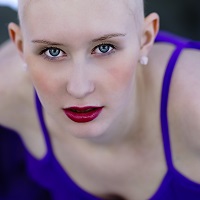
Gillian O'Blenes-Kaufman
2014 Recipient
When Gillian’s cancer continued to spread, even while on chemo, and she learned there was nothing more the doctors could do, she told her parents there were three things she wanted to do before dying.
It was March 2014 and Gillian had only weeks, maybe months, to live and her bucket list looked like this:
1. Get a tattoo;
2. Take a Wish Trip to Greece with her family; and
3. Get married.
Gillian has managed to reach her goals, but one.
1. In June, Gillian and her family took that trip to Greece. Check.
2. A couple of weeks later, she married her boyfriend Michael, just one week after graduating high school. Check.
Two days after the wedding, Gillian and Michael were on their honeymoon in Disneyland—both families in tow. And, in July, Gillian travelled to Mexico on a 10-day mission trip with her youth group. While most teens idled away the hot summer days, Gillian was living an entire lifetime. But she still hasn’t got that tattoo.
Ironically, achieving the most ordinary of goals would present the biggest challenge for Gillian. The tattoo she has in mind is an elaborate image of a tree with branches spreading over her back. The tattoo artist explained that the project would take several weeks to complete with lots of time in between for healing. With her compromised immune system and limited timeframe, Gillian simply didn’t have the time or the capability to heal properly between sessions.
Gillian has already lived a lot longer than doctors expected. If she had known in March that she would live into the fall, Gillian surely would’ve added a fourth goal to her bucket list:
4. Study art at the Alberta College of Art and Design.
“In the past, I’ve always shied away from the thought of doing art professionally because I was afraid it would turn my joy and passion for art into something routine or heartless,” Gillian explains. “Cancer helped to focus my thinking on this. I know now that creating art is what I want to do with the rest of my life, so I’ve enrolled at ACAD for the fall.”
With your help, Gillian is pursuing her dream of being an artist. In late August, Kids Cancer Care held a special scholarship ceremony for Gillian and her family, awarding her with a Kids Cancer Care Derek Wandzura Memorial Scholarship for studies at ACAD this fall. Check.
Gillian is not only a gifted artist; she is a brilliant dancer. She and her sisters, Colleen and Kimberly, have danced competitively for years. Ballet, point, tap, modern, hip-hop and jazz.
As a high-level dancer Gillian, is familiar with pain. But in May 2013, when the pain in her right leg persisted for two months straight, she saw a doctor. The doctor told her it was likely a muscle strain and asked her to stop dancing for a week.
It was competition time, so Gillian loaded up on painkillers and avoided seeing doctors until after the competition.
After the competition, Gillian saw a physiotherapist who knew just by feeling the leg that something was very wrong. A series of X-rays revealed a large mass in Gillian’s right femur.
The next day, Gillian was diagnosed with a bone cancer that had already spread to her lungs. They administered chemotherapy, followed by two surgeries, in which they removed a 26-centimetre tumour from her right femur and two smaller tumours from her lungs. In a third surgery, they replaced her right leg with a metal prosthetic, which has presented a whole new set of challenges for Gillian.
“I set off all the alarms in airport security now,” she laughs. “I’m a real menace.”
“She’s like the bionic woman,” her mother Wendy adds.
Like the bionic woman, Gillian has had to relearn to walk—this time with her bionic leg. With your gifts, Gillian has been rebuilding her strength through regular physiotherapy sessions at PEER (Pediatric Patients Engaging in Exercise for Recovery), a collaborative initiative between Kids Cancer Care, Alberta Health Services and the University of Calgary, Faculty of Kinesiology.
Most crushing of all for Gillian, however; was being told she would never dance again.
Gillian’s cancer has been tough on her younger sisters. Colleen felt a lot of guilt for being so strong and healthy, while her sister was battling cancer. “Gillian is prettier, smarter and more talented than me. Why did she get cancer and not me?” Colleen asked. At one point, her sister Kimberly started questioning whether she should even be dancing at all, while Gillian was so sick.
Gillian was adamant: “You have to,” she said. “You have to dance—for me.”
It was then that her sisters’ dancing took off. As Kimberly’s dancing took on a beautifully poetic expression that hadn’t previously been there, Colleen’s dancing, which had always been brilliantly expressive, became technically strong.
Although it has been incredibly trying, cancer has not stopped the O’Blenes in the least. “As a whole, we’re closer,” says Wendy. “I’m not sure we’ll ever fully weather what’s happened, but our goal as a family has always been to plow through and move on and live life. We’ve chosen to maintain our active life and our busy schedules, but Gillian has been our inspiration through all of it.”
Indeed, Gillian has become her own inspiration, refocusing her creative energy from dancing into visual arts. She’s determined to live life fully for as long as she can.
In the fall of 2014, Gillian completed a semester at ACAD and received straight A's. On Monday, December 8, 2014 Gillian passed away surrounded by family and friends at the age of 18.
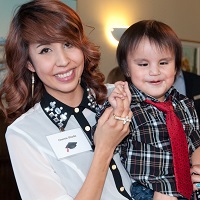
Chelsie Shade
2013 Recipient
“I worked by lamplight at night in our room at Ronald McDonald House, so Angelo could sleep, while I studied. It was tough, seeing him go through that, while also focusing on school, but we did it.” — Chelsie Shade
She may be only 19, but Chelsie Shade already exhibits a maturity and tenacity far beyond her years. She’s been through cancer twice — her own and now her son’s — and, with your help, she’s moving beyond her cancer experiences and following her dream of becoming a pediatric nurse.
When Chelsie was 17 months old, she was diagnosed with bilateral retinoblastoma, a rare but highly aggressive and hereditary eye cancer. Within hours of diagnosis, she and her parents were transferred to the Hospital for Sick Children in Toronto, where Chelsie received emergency surgery to remove the left eye and save her life.
But that wasn’t the end of it.
For years, Chelsie and her parents travelled to and from Toronto every few weeks, so she could access the specialized treatments and technology necessary to treat and monitor her good eye. The emotional and financial toll on the family was enormous.
When Chelsie was finally deemed cancer-free, she learned that she would have to continue making that same trip every few weeks for years to come. This time, Chelsie was the mother and her nine-day-old baby boy was in need of the specialized treatment and follow up available in Toronto.
Growing up partially blind and with a prosthetic eye, Chelsie was determined to spare her son this fate. She fought hard with the doctors to save Angelo’s eye. But the threat of losing Angelo or his eyes is never far away.
Despite travelling to Toronto every few weeks for Angelo’s treatments and monitoring, the single mother from the Bloodtribe of Southern Alberta, managed to stay in school and graduate from high school.
“We’ve survived two years of stress and hardship with my Angelo’s cancer,” says Chelsie. “I took a year off school in 2011 to be in Toronto for his cancer treatments, but I enrolled in online schooling and managed to finish three courses that year.”
Thanks to you, Chelsie is now attending the University of Lethbridge, where she is working toward a degree in nursing with the help of a $2,500 bursary from the Kids Cancer Care Derek Wandzura Memorial Scholarship program.
“I’m planning to pursue a career in pediatric nursing, possibly in oncology, as I have survived my own cancer and now my son’s. I want to help children like Angelo."
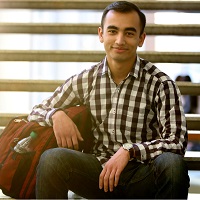
Chaitanya Shah
2012 Recipient
They were looking for a better life for their son when they moved to Canada—the land of ice hockey and subzero temperatures. They didn’t know the move would ultimately save his life and shape the path of his career.
Although he was only eight, Chaitanya remembers clearly the night he and his parents, Biren and Sohal Shah, arrived in Canada. “It was 30 degrees Celsius in Mumbai when we left and -30 in Calgary when we landed.”
Culture shock had nothing on the shock of that subzero weather. And yet, nothing would ever trump the shock of what was to come.
At the end of his grade-eight basketball season Chaitanya was coughing a lot and thought he may have a cold. A chest scan revealed masses in his chest, which the doctor thought may be pneumonia. But when a team of doctors descended upon the Shahs to discuss the results of the scan, Chaitanya knew it was something serious. He remembers thinking, “Why do they need a whole team for this?”
His instincts were right. It was stage 4 germ cell cancer, a highly aggressive cancer that demanded a lengthy and complex treatment protocol.
That night and the intense year that followed would determine the course of his life. Chaitanya is passionate about genetics and cancer and he is determined to be an oncologist one day. “I’m perfect for the position,” he jokes, “given my vast exposure to the profession.”
Even at 13, Chaitanya was thinking the way a doctor might. “There were multiple tumours all through my body,” he says. “There are many types of germ cell cancer but it was so advanced when we caught it that I had them all. I kept thinking ‘Did I miss something? Could I have caught this earlier?’”
As a biological sciences student at the University of Calgary, Chaitanya found an outlet for his passion and his inquisitive mind. With the help of a scholarship, made possible by you, Chaitanya graduated with a Bachelor of Health Sciences with honors in 2016.
His experience with cancer has taught him to take things in stride. “It’s given me a ferocious tenacity to go after what I want, but mostly it’s given me perspective. As stressful as it gets during exams, in the back of my mind, I go, ‘At least I don’t have cancer.’”
And the wry sense of humour? That’s quintessential Chaitanya—a quality that helped him during his cancer journey and that will one day serve him as an oncologist as he helps others facing cancer. Chaitanya started medical school in 2017 at the University of Calgary with plans to graduate in 2020.
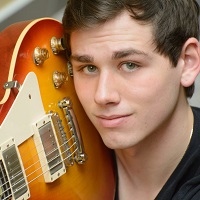
David Dallas
2012 Recipient
“My hands started to blister and I couldn’t even play my guitar, the thing I love most in the world.”—David Dallas
When Ringo Starr cried out, “I’ve got blisters on my fingers,” at the end of the Helter Skelter recording on the Beatle’s white album, his blisters were for entirely different reasons than David Dallas’ blisters. Apparently, Ringo played the drums so forcefully on this track, the only way out of the session, which had become an epic jam session, was to yell out in protest to his band mates.
If protesting against blisters had been a viable option for David, he surely would have protested, if only so he could play guitar again. But David’s blisters weren’t from playing a musical instrument for too long. His blisters were one of the side effects of the chemotherapy he was receiving to save his life.
David was diagnosed with stage 3 non-Hodgkin’s lymphoma when he was 12 years old. It started with severe stomach pain that wouldn’t go away. After several visits to the Alberta Children’s Hospital emergency centre, David received an ultrasound that revealed an 18-centimetre tumour. Over the next four months, David underwent intensive cancer treatment, which included chemotherapy by spinal tap to both his spine and brain.
What kept David going during this time was the support of his family and friends, the amazing nurses at the Alberta Children’s Hospital and, of course, his music. Isolated at the hospital and unable to play guitar, David’s only thought was the moment he would play again.
On the horizon for David was the fulfillment of a wish through the Children’s Wish Foundation. Unlike most kids, however, David’s wish wasn’t a trip to Disneyland. David had asked for music equipment and a Les Paul guitar, his Sadie, the guitar he still uses today.
And David is still holding on to that dream of making music, a dream that you are helping him realize through a Kids Cancer Care Derek Wandzura Memorial Scholarship.
When David auditioned for the jazz guitar program at the Mount Royal University Conservatory of Music, it was Sadie who saw him through the audition. Unfortunately, for David, the jazz program at Mount Royal was later cancelled due to funding constraints, so David used the scholarship to complete his first year of general studies to prepare for future studies in jazz music.
“The one thing I learned during my cancer experience was to not sweat the small stuff and to keep my eye on the big picture,” says David.
Like the 12-year-old boy, biding his time at the hospital, David is maintaining perspective, while waiting for a chance to formally study music and hone his skills as a jazz musician. He’s waiting for admission to the Berkley School of Music in Boston. Once again, it was Sadie who saw him through his audition at Berkley and, once again, when he is accepted, it will be Sadie he takes to Boston.
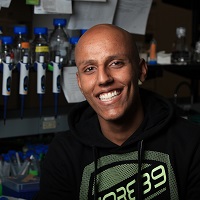
Jasinder Gill
2009 Recipient
When Jasinder Gill was suddenly too weak to walk to class or play sports in his senior year, he didn’t tell anyone. He kept it to himself, until one evening, when the telephone rang.
Jasinder (Jason) vividly remembers the night he learned he had leukemia.
June 20th 2008: Jason was quietly studying for a physics exam. The telephone rang and his mother answered, but “with her limited English, she couldn’t understand,” says Jason, “so she passed the receiver to me.”
Jason picked up and a doctor from the lab, where he’d recently had blood work done, warned Jason he was about to give him difficult news. “He told me I had leukemia,” recalls Jason. “My hemoglobin count was extremely low, 47, and he told me I should get to the hospital immediately.”
But Jason didn’t do that. Not exactly.
The third son of hardworking immigrants from India, Jason was used to being strong and independent. Always inquisitive and resourceful, it was natural for him to research leukemia online before leaving for the hospital. A first-generation Canadian, Jason knew there would be no parental buffers between himself and the doctors at the hospital. “I felt it was crucial I understand leukemia, so I could understand what the oncologists were saying.”
Jason put his naturally inquisitive mind and research skills to work during his biological sciences studies at the University of Calgary. With the help of a scholarship from Kids Cancer Care, he completed an undergraduate degree. He also completed a Master's of Science degree through the university.
“Knowing that someone is looking at you and saying, ‘We’re going to invest in you because we believe you can do something with your life,’ that is meaningful,” says Jason.
Jason's lifelong dream was to work in dentistry. He received his dental education in Vancouver and is now back in Calgary working at a local dental office, which he says he is "absolutely loving."
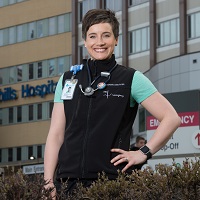
Amandha Richter
2008 Recipient
“Eva and I used to lay side by side, getting chemo together. We talked about going to university together and changing the world some day and now she was dying. I promised her: ‘I will keep fighting for you Eva. I don’t know how I will do it, but I will.’” – Amandha Richter
Eva passed away in December, 2001 at the age of 15. She wasn’t the only friend Amandha would lose to cancer, but she was the friend who would forever change the course of her life.
Amandha recalls the first time meeting Eva. They were both at the hospital, waiting to receive treatment. Amandha had just been diagnosed with Hodgkin’s lymphoma and Eva was battling a brain tumour.
Eva kept looking at Amandha and Amandha kept trying to avert her eyes. Amandha was 17 and angry, struggling to make sense of the disparate worlds of cancer and life as a teenager. Finally, with great difficulty, Eva got up, walked over and stood directly in front of Amandha. When Eva asked Amandha how she was, Amandha finally asked her how she was.
“Well, I can walk today, so today is a good day,” Eva replied and they immediately became great friends.
After losing Eva, Amandha was left to battle her own cancer-related demons.
“My sister Whitney used to say I went from being 17 to 40 overnight. My physical person was completely the same, but inside — emotionally — I was different. I no longer shared common ground with my school friends, so I lost a lot of friends that way.”
But Amandha was already cancer-weary, having lost her best friend Loni to cancer years before, when she 10 and Loni was 11.
“I’d only known people who had died from cancer,” Amandha says. “When I was diagnosed, I thought: ‘I’m 17 and I’m going to die. I’m not going to graduate and go to university. I’m not going to get married and have kids. I’m going to die.”
Amandha survived cancer, but not unscathed. As with many childhood cancer survivors, she struggled with depression for years after treatment. Amandha was eventually diagnosed with post-traumatic stress disorder, periodically seeing a therapist to manage her PTSD.
a fundraising legacy
In the aftermath of cancer, Amandha started making good on her promise to Eva. Little did she know that she and fellow cancer survivors Taryn Penrice and Jeff McNabb would start a legacy of fundraising for pediatric cancer research in central Alberta.
After organizing a shave event in 2001 and raising more than $75,000 for Kids Cancer Care, Amandha joined forces with her friends Taryn and Jeff to organize the first Golf a Kid to Cure tournament in Red Deer.
Jeff’s family later went on to organize the Build a Kid to Cure initiative, where trades and individuals from the housing industry donate time and resources to build a home. Proceeds from the sale of the home go to Kids Cancer Care and other local charities.
Sadly, Jeff passed away in 2011 and his parents Dave and Brigitte McNabb kept the legacy alive by annually hosting the Build/Golf a Kid to Cure events in his memory. With the support of the employees at Dominion Lending Centres Regional Mortgage Group and the Red Deer community, the McNabbs have raised hundreds of thousands of dollars for childhood cancer research.
saving lives
But when Amandha promised to keep fighting for Eva in 2001, she had more than fundraising in mind. She had plans to become a pediatric oncology nurse.
When Kids Cancer Care introduced the Derek Wandzura Memorial Scholarship Fund in 2008, Amandha was among the first 26 cancer survivors in Alberta to receive a scholarship. With the help of that scholarship, Amandha pursued a Bachelor of Science in Nursing through a joint degree program at Red Deer College and the University of Alberta.
“I was so grateful to receive that scholarship,” says Amandha. “It gave me the opportunity to focus on my studies.”
Amandha is now using her nursing career to continue paying it forward, working as a critical care nurse in the Emergency Department at the Foothills Medical Centre in Calgary.
“It can be tough, working as an emergency nurse,” she says. “We’re with people on the worst day of their life. We are part of that really bad day. You save their life and they go away and you never see them again. It’s so intense and immediate. Afterwards, you can say, ‘I did that for them. I helped save their life.’”
Amandha remembers her first emergency ward experience: “I was doing my final preceptorship in Atlanta and I was terrified. One of the nurses said to me, ‘Don’t worry; you won’t be doing chest compressions on your first day.’ I did chest compressions on two patients that day and they both lived,” she laughs. “I must be an adrenaline junky or something. It was such a high to know that I had helped save them.”
More than the adrenaline-high, Amandha loves the fact that she can give her entire being to her patients: “I can give all of myself to nursing. I can use my brains, my hands and my heart. I use all of these parts of myself.”
A big part of Amandha also loves the diversity of the role — from newborns to seniors, and everyone in between. Each patient presents with a different disease or medical issue, from hang nails to heart attacks. Amandha is constantly learning and the breadth of her knowledge is ever expanding.
But there is one area of nursing that Amandha is currently unable to go — pediatric oncology.
“I’ve tried, but I can’t do it,” she says. “I used to see that as a failure, but I don’t anymore.”
Working with a therapist over the past few years, Amandha has learned to manage her PTSD by identifying triggers and dealing with them early on, so they don’t escalate. Helping children on a pediatric cancer unit is one of those triggers.
“I don’t know if cancer follows us or if, as former patients, we follow cancer, but it is always there,” says Amandha. “From diagnosis to my dying day, it will forever be part of me.”
For now, Amandha continues to fight for young people like Eva by raising awareness through public speaking engagements at two Red Deer high schools.
“I couldn’t save Eva’s physical being,” Amandha says, “but I can keep her with me spiritually. I carry her with me. Who knows how Eva would have lived or fulfilled her potential. I’m helping in my way. I think that’s how we honour the people who are no longer with us. We live for them.”
As a teen, Amandha could not save Eva’s life. Nor could she save Loni’s life. But as a critical care nurse, Amandha saves lives every day. We never know exactly how our dreams and promises will manifest. They can manifest in unexpected ways. Amandha’s dreams and promises led her to a career in nursing at the Foothills Emergency Department, where every day she enacts the one thing she was unable to do as a kid – save lives.
